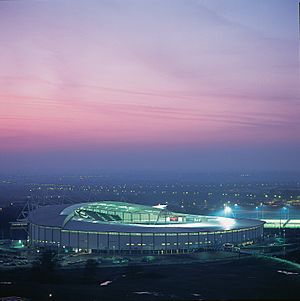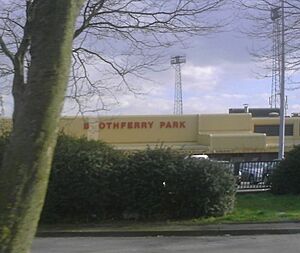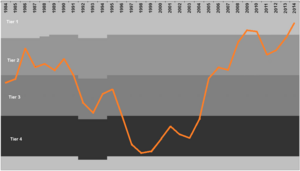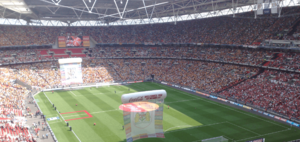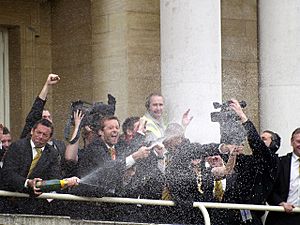History of Hull City A.F.C. facts for kids
Hull City A.F.C. is a football club from Hull, England. It was started on June 28, 1904. Before this, it was hard to create a football club in Hull because rugby league was very popular, with teams like Hull F.C. and Hull Kingston Rovers.
In their first year, Hull City only played friendly matches. They couldn't join The Football League right away. Their very first game was on September 1, 1904, against Notts County at a stadium called The Boulevard. About 6,000 people watched as City played to a 2–2 draw against the more experienced team. Hull City then played in the FA Cup but lost in the early rounds. After some issues with their stadium, they moved to the Anlaby Road Cricket Ground.
Contents
Joining the Football League
After playing 44 friendly games, Hull City finally joined the Football League Second Division for the 1905–06 season. They played against famous teams like Manchester United and Chelsea. Their first league game was a great start, beating Barnsley 4–1. Hull City finished fifth in their first league season.
The next year, a new stadium was built for the club. Hull City often finished in the top half of the league table. They almost got promoted in the 1909–10 season, finishing third. They missed out on promotion by a tiny amount of goals! Before the First World War, Hull City reached the quarter-finals of the FA Cup in 1915, which was a big achievement.
After the Wars
One of Hull City's biggest achievements in cup competitions happened in 1930. They reached the semi-finals of the FA Cup. On their way, they beat strong teams like Leeds United and Manchester City. They even beat Newcastle United in a replay. However, they lost to Arsenal in the semi-final after a replay.
In the 1948–49 season, with former England player Raich Carter as manager, Hull City won the Third Division (North). Their new stadium, Boothferry Park, saw huge crowds. A record 55,019 fans watched a game against Manchester United, which is still the club's highest attendance today.
For many years, Hull City moved between the second and third levels of English football. They won the Third Division championship again in 1959 and 1966. They came close to reaching the top league in the early 1970s but couldn't quite make it. The club faced some tough times in the late 1970s and early 1980s, even dropping to the fourth level of football for the first time.
In 1983, with a new chairman and manager, Hull City earned promotion back to Division Three. They had a young team with future stars like Brian Marwood and Steve McClaren. They almost got promoted again the next season but missed out by just one goal. Under player-manager Brian Horton, Hull City reached the Second Division in 1985. They continued to have ups and downs, with managers changing and the team's performance being inconsistent.
Fighting to Stay Alive: The 1990s
The 1990s were a very difficult time for Hull City. The club faced serious money problems, and it looked like they might even go out of business. Their performance on the field also got worse, and there was a real risk of dropping out of the Football League entirely.
The 1997–98 season was one of the toughest. Hull City earned very few points and finished near the bottom. Luckily, other teams had even worse seasons, so Hull avoided relegation. Fans remember the 1998–99 season as "The Great Escape" because the team, led by player-manager Warren Joyce, managed to avoid relegation after being stuck at the bottom of the table.
The Tigers Start to Climb
Things started to look up when a new chairman, Adam Pearson, invested money into the club. This helped the team improve. In 2000–01, Hull City reached the play-offs for promotion but lost in the semi-finals. Most importantly, new owners took over, which solved the club's money worries and saved them from closing down.
In December 2002, Hull City moved to a fantastic new stadium, the Kingston Communications Stadium (now called the MKM Stadium), after 56 years at Boothferry Park. This new stadium helped turn the club's fortunes around. The two seasons after the move were incredibly successful. Hull City finished as runners-up in Division Three in 2003–04 and then runners-up in League One in 2004–05. This meant they achieved back-to-back promotions, moving up to the Championship, the second tier of English football! The 2005–06 season was about settling into the Championship, and Hull City finished safely in 18th place.
From 2006 Onwards
Championship Challenges
After a successful period, manager Peter Taylor left Hull City in June 2006. Phil Parkinson took over, and Phil Brown joined as his assistant. Hull City spent money on new players, but they had a very poor start to the 2006–07 season. Parkinson was sacked in December 2006, with the team in the relegation zone.
Phil Brown became the caretaker manager and quickly improved the team's results. By January 2007, Hull City was out of the relegation zone, and Brown was given the manager's job permanently. Hull City secured their place in the Championship for the next season with a crucial win against Cardiff City.
Championship Success and Premier League Dream
In 2008, new chairman Paul Duffen and manager Phil Brown led Hull City to an amazing season. They finished third in the Championship and qualified for the play-offs. They beat Watford in the semi-finals. Then, on May 24, 2008, they played Bristol City in the final at Wembley Stadium. Hull City won 1–0, with local hero Dean Windass scoring the winning goal! This victory meant Hull City was promoted to the Premier League for the very first time in their history. It was an incredible journey, moving from the bottom division to the top in just five seasons.
Life in the Premier League
The 2008–09 season was Hull City's first in the Premier League. They sold out all their season tickets, showing how excited the fans were. They started the season brilliantly, winning their first-ever top-flight game against Fulham 2–1. After nine games, Hull City were even joint-top of the league for a short time!
Their form slowed down later in the season, but they went into the final game in 17th place, just above the relegation zone. Even though they lost their last game, other results went their way, and Hull City stayed in the Premier League for a second season!
In 2009, Hull City took part in the Barclays Asia Trophy tournament in China. They played against other English teams and a local Chinese team.
In October 2009, chairman Paul Duffen resigned, and former chairman Adam Pearson returned. In March 2010, manager Phil Brown was replaced by Iain Dowie.
Back to the Football League
Hull City was relegated from the Premier League on May 3, 2010, after a 2–2 draw against Wigan Athletic. After relegation, Nigel Pearson was appointed as the new manager in June 2010. In November 2010, a father and son, Assem Allam and Ehab Allam, took over ownership of the club.
Another Premier League Return
On May 4, 2013, Hull City made a dramatic return to the Premier League! They drew 2–2 with Cardiff City on the final day of the season, and their rivals Watford lost, which meant Hull City secured promotion.
In the 2013–14 season, they achieved their highest-ever league finish (16th) and reached their first-ever FA Cup Final! They lost 3–2 to Arsenal after extra time. They were relegated from the Premier League again in 2014–15 but bounced straight back up by beating Sheffield Wednesday in the 2016 Football League Championship play-off final at Wembley.
From Premier League to League One Again
In July 2016, manager Steve Bruce resigned, and Mike Phelan became the caretaker manager, then permanent head coach. However, Phelan was sacked in January 2017, and Marco Silva took over. Hull City was relegated back to the Championship in May 2017, and Silva resigned.
Leonid Slutsky became head coach in June 2017 but left in December after a series of poor results. Nigel Adkins then took charge and helped the team finish 18th. The next season, despite a tough start, they finished an impressive 13th, thanks to star player Jarrod Bowen. Adkins resigned at the end of that season.
In June 2019, Grant McCann was appointed head coach. The team started the 2019–20 season well, but after selling two key players, Jarrod Bowen and Kamil Grosicki, in January, their form collapsed. They only won one more game and finished last, meaning they were relegated to EFL League One.
However, Hull City quickly bounced back! On April 24, 2021, they were promoted back to the Championship after a 2–1 win against Lincoln City. The following week, they beat Wigan Athletic 3–1 at home and were crowned EFL League One Champions!
New Owners and New Coaches
On January 19, 2022, after many talks, Turkish media boss Acun Ilıcalı and his company, Acun Medya, took over Hull City. This ended the 11-year ownership of the Allam family. At the time, the club was 19th in the Championship. On January 27, 2022, Shota Arveladze was announced as the new head coach. Hull managed to stay in the Championship, finishing 19th in the 2021–22 season.
Arveladze was sacked in September 2022 after four league defeats. Former player Liam Rosenior was appointed head coach in November 2022. He improved the team's defense and away record, guiding Hull to a 15th-place finish in the 2022–23 season. However, on May 7, 2024, after finishing seventh in the 2023–24 season and just missing out on the play-offs, Rosenior was sacked. The owner, Acun Ilicali, explained that they had different ideas about how the team should play football, with Ilicali wanting more attacking play.
 | Anna J. Cooper |
 | Mary McLeod Bethune |
 | Lillie Mae Bradford |


